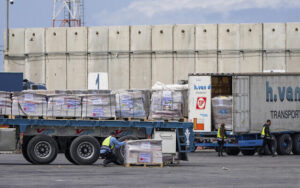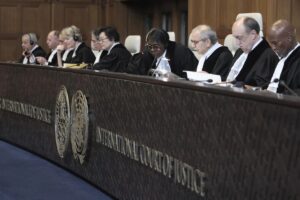
The National Interest Foundation Newsletter
Issue 232, April 12, 2024
Welcome to our NIF Newsletter. This week, we look into how Israel continues to block and attack aid convoys after vowing to ease restrictions on food and water, analyze Nicaragua’s filing of a case at the International Court of Justice (ICJ) in an attempt to halt Germany’s supplying of arms to Israel, and examine the way in which external intervention from destructive actors like the United Arab Emirates has exacerbated the dire humanitarian crisis in Sudan.
Israel Continues to Block and Attack Aid Convoys After Vowing to Ease Restrictions on Food and Water

International watchdog organizations like Human Rights Watch have drawn attention to the Israeli government’s hindering of humanitarian aid. (Photo from AP)
Israel Continues to Block and Attack Aid Convoys After Vowing to Ease Restrictions on Food and Water
This week, Israel has continued to block and attack aid convoys after recently vowing to ease restrictions on food and water entering Gaza. United Nations International Children’s Emergency Fund (UNICEF) trucks were hit by Israeli gunfire as they attempted to deliver supplies to children in the northern part of the territory. This took place despite the fact that the convoy was cleared for entry. Last Saturday, the United Nations stated that Israel had authorized the opening of nearly two dozen bakeries and a waterline in the northern part of Gaza, as well as additional aid routes. Several months ago, Israel claimed that it placed no restrictions on food, water, and other much-needed supplies entering Gaza, even going so far as to accuse reputable news outlets of publishing “fake” articles for documenting clear evidence of their impeding of humanitarian aid. Yet now, unsurprisingly, in the aftermath of the universal outrage regarding last week’s Israeli strikes on a World Central Kitchen convoy in Gaza which killed seven humanitarian aid workers, Israel had supposedly agreed to ease restrictions and increase the flow of humanitarian aid – in a development which proves that it was deliberately hindering this all along. While Israel claims that it is boosting aid to Gaza, the United Nations and relief agencies have said that little has actually changed. The new Israeli measures were reported to have come following a tense phone conversation between Israeli Prime Minister Netanyahu and U.S. President Biden, with the latter threatening to condition U.S. support on Israel taking concrete actions to protect humanitarian aid workers and civilians. U.S. Secretary of State Blinken also signaled that the Biden administration was prepared to alter its approach, remarking that “If we don’t see the changes that we need to see, there’ll be changes in policy.” Since the onset of the War on Gaza, various entities have highlighted how the dire humanitarian crisis there is of Israel’s making, brought about by their limiting of land entry points for aid, arbitrary inspection process, and the undermining and targeting of humanitarian groups.
Organizations like Human Rights Watch and Amnesty International have outlined the multitude of ways in which Israel has impeded humanitarian aid efforts. Since October, Israeli authorities have imposed major restrictions on food, water, electricity, fuel, and medical supplies into Gaza. They have closed border crossings and obstructed the delivery of aid to the enclave’s more than 2 million people, nearly half of whom are children. Thus, for months, humanitarian groups and organizations have been repeatedly calling for the opening of additional routes in order to allow for the delivery of aid into Gaza. Food convoys and other humanitarian aid operations have not only been routinely blocked, but subjected to heinous attacks as well, as took place in the high-profile incident last week involving World Central Kitchen. This is far from an isolated occurrence, and on the contrary, there have been an array of Israeli attacks, including against UN food convoys and civilians seeking humanitarian aid supplies. On top of these attacks, trucks and convoys transporting food and other humanitarian relief are regularly subjected to arbitrary inspections whereby items are refused without justifiable reason. There have been numerous cases in which contents of humanitarian aid convoys have been cleared in advance by Israeli officials, only to be later turned away after inspection or even attacked.
Humanitarian officials have pointed out that after deliberately hindering aid and tightening its vicious blockade on Gaza over the past six months, Israel bears responsibility for the devastating humanitarian crisis there and does not warrant being commended for allegedly taking minimal steps now at the behest of increased pressure to do so from the United States and others. As one Amnesty International official put it, “Opening additional aid routes sooner could have stopped hundreds of thousands of people from enduring appalling levels of hunger.” Instead, Israel has weaponized access to food, water, and other humanitarian aid. This abhorrent behavior has led food insecurity experts to express utter shock at the rate in which the hunger and malnutrition crisis has spread throughout Gaza during the past six months. What is particularly troubling and upsetting is the fact that unlike other humanitarian crises that can often times be caused by natural phenomena like severe drought or extreme weather, the conditions in Gaza are wholly man-made and could have been prevented.
For months, international aid institutions and rights advocates have been trying to underscore that humanitarian assistance has been consistently and arbitrarily restricted by Israeli authorities. With attacks against aid groups such as World Central Kitchen and others, Israel is also exhibiting a blatant disregard for norms of international humanitarian law and deterring these vital organizations from operating in Gaza for understandable fear of their safety. Israel’s unlawful conduct goes beyond one single incident, and there is a glaring pattern of efforts to hinder humanitarian aid – whether that be through intentional direct attacks on convoys or the impeding of them via an unjust inspection process and the obstruction of routes.
Nicaragua Files a Case at the ICJ in an Attempt to Halt Germany’s Supplying of Arms to Israel

Nicaragua’s case is one of many international calls to halt arms exports to Israel. (Photo from AP)
Nicaragua Files a Case at the ICJ in an Attempt to Halt Germany’s Supplying of Arms to Israel
In response to repeated human rights abuses in Gaza, Nicaragua has brought charges against Germany at the International Court of Justice (ICJ) for “facilitating the commission of genocide” against Palestinians by Israel. In statements from Carlos Jose Francisco Arguello Gomez, Nicaraguan Ambassador to the Netherlands and the lead of Nicaragua’s delegation, he described Israel’s actions as a breach of humanitarian law and expressed that there was a genocide taking place against the Palestinian people. Due to the nature of it being such a dire and urgent situation, Nicaragua has requested that the ICJ exercise emergency actions to prevent Germany from further supplying Israel with weapons and assistance. Nicaragua has outlined that Germany is in breach of the Genocide Convention with their weapons transfers and the cessation of funding to the humanitarian agency UNRWA. During the course of 2023 alone, some 30% of Israel’s military equipment was purchased from Germany in an amount totaling $326 million, and Germany remains one of Israel’s largest international suppliers in 2024.
Germany has unsurprisingly rejected the allegations that they are complicit in Israel’s human rights violations in Gaza, with government spokesman Wolfgang Buechner stating “we note Nicaragua’s lawsuit, and we deny the allegations as unjustified.” Meanwhile, however, German Chancellor Olaf Scholz has faced increasing domestic discontent, and groups of German civil servants have called on their government to cease arms deliveries to Israel in light of ample evidence of their war crimes in Gaza. Tania von Uslar-Gleichen, one of Germany’s defense lawyers, said “our history is the reason why Israel’s security has been at the core of Germany’s foreign policy,” essentially arguing that Germany’s abuses under the Nazi regime are the reason behind their support of Israel. Germany went on to claim that their transfers to Israel had benign purposes and limited capabilities, but for many human rights experts, the destructive scale of Israel’s military offensive demonstrates how the supplying of arms from Germany and others can be used to sustain this. In recognition of Israeli humanitarian violations, the defense seemed to admit and explain that Germany does have a responsibility to remind Israel of the rules of international humanitarian law. Nicaragua’s case against Germany is not only meant to target the arms suppliers, but also aims at the nature of Israel’s military campaign itself, accusing the country of genocidal acts.
The Nicaraguan case compounds the separate one filed by South Africa at the ICJ earlier this year, where they also accused Israel of engaging in genocidal actions against Palestinian civilians in Gaza. The preliminary decision by the judges in the Hague stated that Israel must take “immediate and effective measures” to protect Palestinian civilians in Gaza by ensuring that adequate humanitarian aid is allowed into the enclave, and to take every possible measure to avoid genocidal acts. International observers argue that Israel has thus far failed to live up to either of these standards. Israel has rejected that their actions amount to genocide, and claims that it is acting in self-defense following the October 7th Hamas attacks. However, it is impossible to disregard the blatant Israeli human rights violations and war crimes that have taken place since October. More than 33,000 Palestinians have been killed, an alarming number of which have been children, and the humanitarian crisis in Gaza is extremely dire. The recent case brought to the ICJ by Nicaragua only strengthens the merit and validity of South Africa’s case, and attempts to draw attention to other actors complicit in Israeli war crimes.
Germany is second to only the United States in the supplying of arms to Israel. According to the Stockholm International Peace Research Institute, between 2013 and 2022 Israel received 68% of their weapons from the U.S. and 28% from Germany. However, analysts contend that it would be difficult to bring the U.S. before the court due to Washington’s lack of recognition of the ICJ’s power to compel appearance. Still, Nicaragua sought to include the U.S. sales in their case anyway, saying that the U.S. and Germany collaborated on certain military programs. Experts have highlighted that without the support of the United States, Israel’s military offensive in Gaza would not be sustainable. Other suppliers to Israel such as Italy and Canada have claimed that they stopped their weapons transfers to Israel, but have continued to send arms in “honor of previous commitments.” Following the recent killing of seven aid workers from the World Central Kitchen as a result of multiple Israeli airstrikes, there have been renewed calls to halt weapons transfers to Israel, with last week’s incident receiving international condemnation. Some U.S. Congressmembers have cited American laws that should prohibit arms exports to Israel due to the lack of humanitarian aid they are letting into Gaza. The UN’s top human rights body has also recently called on countries to cease weapons transfers to Israel because of the snowballing humanitarian disaster in Gaza and the grave human rights violations that are taking place there. Nicaragua’s case, while a step in the right direction, will likely take years to receive a final ruling. Additionally, without a final decision yet on South Africa’s case regarding whether Israel is committing genocidal acts, it will be difficult to accuse Germany of supporting genocide. Until the decision is made, however, Germany and the United States should cease their supplying of weapons to Israel since there is growing evidence of war crimes and human rights violations being committed in Gaza.
External Intervention from Destructive Actors Like the UAE Has Exacerbated the Dire Humanitarian Crisis in Sudan

War rages on in Sudan, in large part due to interference from outside entities such as the United Arab Emirates. (Photo from Reuters)
External Intervention from Destructive Actors Like the UAE Has Exacerbated the Dire Humanitarian Crisis in Sudan
Almost exactly one year ago, a violent civil war in Sudan broke out between the Sudanese Armed Forces (SAF) and the paramilitary Rapid Support Forces (RSF), resulting in a massive humanitarian disaster that has displaced nearly 8.5 million civilians. The conflict erupted due to a power struggle between army chief Abdel Fattah al-Burhan and RSF commander Mohamed Hamdan “Hemedti” Dagalo, following the ousting of former despot Omar al-Bashir by a popular uprising back in 2019. The Armed Conflict Location & Event Data Project (ACLED) has documented that the violence has led to the deaths of nearly 16,000 people, although analysts have said that the number may be much higher due to the lack of records being kept. International humanitarian and human rights laws are being violated by the RSF in the form of attacks on civilians and conflict-related sexual and gender-based violence. These actions – according to experts – have undermined the RSF’s legitimacy among the Sudanese people, making the prospect of their governance much more unlikely. Several efforts are underway to try and help bring the war to an end. Still, regional rifts between mediating countries including Russia, Saudi Arabia, and the United Arab Emirates have served to perpetuate and exacerbate the massive humanitarian crisis.
One of the reasons that the war in Sudan continues to rage on is the international meddling in the conflict, particularly from the United Arab Emirates. It was originally speculated that SAF would win a swift victory against the RSF due to their superior manpower, airpower, and control of both Sudan’s national army and institutions. Cameron Hudson, a former CIA analyst and senior associate at the CSIS Africa Program, believes that the RSF has been able to hold on due to external support coming from the UAE. These arms are smuggled into the country by plane through neighboring countries, though supply routes have shifted due to international monitoring under the UN Security Council’s arms embargo. It has also been reported that the Russian military group Wagner has been supplying surface-to-air missiles and aiding in the weapons supplies to the RSF – further prolonging the conflict. According to Middle East Eye, Hemedti has headquartered his commercial empire in Dubai and reportedly has ties with some of the UAE’s highest-ranking officials. The UAE also has a vested interest in Sudan for economic reasons, as it searches for more resources and a foothold on the African continent.
Sudan has long been afflicted by humanitarian challenges, but the ongoing conflict has exacerbated many of these issues including disease, climate emergencies, and instability. Sudan is rife with both economic and political turmoil, which has perpetuated poor living conditions in the country, including the collapse of vital infrastructure systems. The UN refugee agency UNHCR has outlined how over half of Sudan’s population – some 25 million people – are in dire need of aid and protection, due to the country’s extreme shortages of food, water, medicine, and fuel. The agency has also reported that nearly 18 million people are facing acute food insecurity. These unlivable conditions have forced many residents to flee their homes in search of safety, with around 6.9 million being internally displaced and 1.6 million seeking refuge in neighboring countries such as Chad, Egypt, South Sudan, Ethiopia, and the Central African Republic. Today, South Sudan is absorbing the most refugees from Sudan, with the country having received an average of 1,800 people a day and over 640,000 people in total. Despite these nearby countries’ efforts, only an estimated 7% of the requirements outlined in the 2024 Regional Refugee Response Plan for Sudan have been fulfilled. Similarly, the Humanitarian Response Plan for Sudan is just 6% funded. Aid groups are struggling to get their humanitarian assistance into Sudan due to blocked access, security risks, and other logistical challenges. With these restrictions in funding and attention, many displaced Sudanese civilians are unable to obtain even the bare minimum necessary to survive. Due to other pressing contemporary global events, both coverage and attention on the conflict in Sudan has unfortunately been reduced, but the humanitarian situation there is very serious as well and is continuing to deteriorate.
